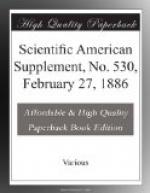Having thus given a general description of the various motors which were presented for competition, I will now give a brief summary of some of the principal particulars obtained during the competition. In the first place, it may be mentioned that the jury consisted of the following:
President.—M. Hubert, Ingenieur en Chef, Inspecteur de Direction a l’administration des chemins de fer de l’Etat Belge.
Vice-President.—M. Beliard, Ingenieur des Arts et Manufactures, delegue par le Gouvernenent Francais.
Members.—MM. Douglas Galton, Capitaine du Genie, delegue par le Gouvernement Anglais; Gunther, Ingenieur, Commissaire General de la Section allemande a l’Exposition d’Anvers; Huberti, Ingenieur a l’administration des chemins de fer de l’Etat Belge, Professeur a l’Universite de Bruxelles; Dery, Ingenieur Chef de service a l’administration des chemins de fer de l’Etat Belge.
Secretary.—M. Dupuich, Ingenieur Chef du service du material et de la traction a la Societe Generale des chemins de fer economiques.
Reporter.—M. Belleroche, Ingenieur en Chef, a la traction et au material des chemins de fer du Grand Central.
Members added by the Jury.—MM. Vincotte, Ingenieur, Directeur de l’Association pour la surveillance des machines a vapeur; Laurent, Ingenieur des mines et de l’Institut electro-technique de l’Universite de Liege.
The original programme of the conditions which were laid down in the invitation to competitors, as those upon which the adjudication of merit would be awarded, contained twenty heads, to each of which a certain value was to be attached; and, in addition to these special heads, there were also to be weighed the following general considerations, viz.:
a. The defects or inconveniences established in the course of the trials.
b. The necessity or otherwise of turning the motor, or the carriage with motor, at the termini.
c. Whether one or two men would be required for the management of the engine.
As regards these preliminary special points, the compressed air motor, as well as the Rowan engine, required to be turned for the return journey, whereas the other motors could run in either direction.
In regard to this, the electric car was peculiarly manageable, as it moved in either direction, and the handle by which it was managed was always in front, close to the brake. This carriage was the only one which was entirely free from the necessity of attending to the fire during the progress of the journey, for even the compressed air engine had its small furnace and boiler for heating the air.
Each of the motors under trial was managed by one man.
The several conditions of the programme may be conveniently classified in three groups, under the letters A, B, C. Under the letter A have been classed accessory considerations, such as those of safety and of police. These are of special importance in towns. But their relative importance varies somewhat with the habits of the people as well as with the requirements of the authorities; for instance, in one locality or country conditions are not objected to which, in another locality, are considered entirely prohibitory.




